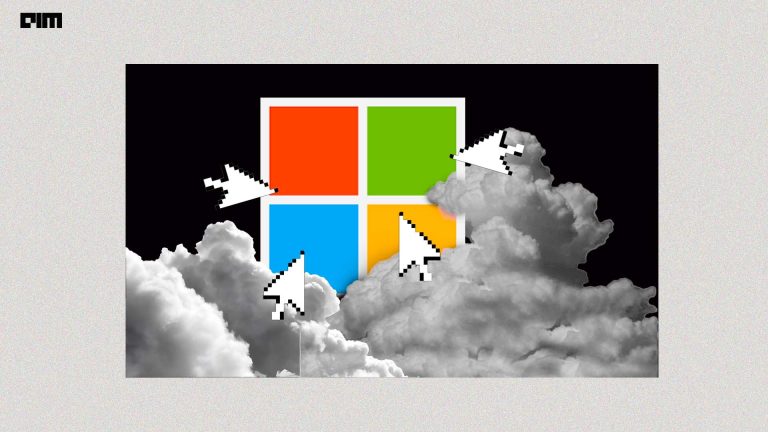When it comes to healthcare, the challenge lies not only in ensuring the availability of Indic datasets to train AI models but also in safeguarding patient privacy and balancing innovation with ethical guidelines, particularly concerning bias and transparency.
These complexities, clubbed with the diversity in India’s healthcare needs, have propelled tech giant Microsoft to craft AI solutions that resonate with local contexts, languages, and cultural nuances.
“Our approach involves co-creating solutions with Indian healthcare providers and tailoring them to address these unique challenges,” Venkat Krishnan, executive director of public sector, healthcare, and education at Microsoft India, told AIM.
As a guiding principle for its AI initiatives in India, the company wants to democratise technology-powered healthcare accessible to all.
The introduction of mixed reality devices, such as Microsoft HoloLens, has been a game-changer, particularly in Tier-2 and Tier-3 locations. “These devices allow clinicians to assist their peers during consultations and surgeries, irrespective of geographical boundaries,” Krishnan commented.
However, Microsoft HoloLens competes with several advanced AR and VR models in this space like Google Glass, Magic Leap, Meta Oculus, Apple Vision Pro and more.
Similarly, Krishnan stated that AI-powered chatbots are making a major impact in the field by providing accurate information, facilitating appointment bookings, and offering services in local languages, thus reaching the remotest of patients.
The company works closely with healthcare providers and institutions to develop and implement customised solutions that address real-world needs.
Additionally, Microsoft’s AI services are also automating operational and administrative tasks, such as documentation and managing Electronic Medical Records (EMR), which has reduced hospital costs and alleviated physician burnout.
The company has partnered with Apollo Hospitals to develop AI algorithms to detect heart disease risks and improve treatment.
Additionally, it has collaborated with the LV Prasad Eye Institute and other global partners on the Microsoft Intelligent Network for Eyecare to predict outcomes and prevent visual impairments.
The company also worked with the Telangana government to screen children’s vision and launched a mobile vision rehabilitation unit with Sankara Eye Hospital. Other projects include the 99 Dots technology for tuberculosis treatment adherence and various partnerships to enhance hospital management and data analysis through cloud solutions and AI.
Microsoft Fabric for Smart Health Analytics
At Microsoft Build last week, the company introduced real-time intelligence in its AI-powered analytics platform, Microsoft Fabric, to provide a comprehensive SaaS solution, allowing customers to efficiently analyse and act on large-scale, and time-sensitive data.
“The healthcare sector faces unique challenges: patients want convenient, personalised digital services, while the industry faces workforce burnout, rising costs, and health equity gaps. Hospitals create massive amounts of data (50 petabytes annually), but only 3% of it is effectively used,” said Krishnan.
Microsoft Fabric addresses these issues by unifying complex, siloed data using standards like FHIR and DICOM. It supports secure data access, analysis, and visualisation with tools like Azure Synapse Analytics, Azure Machine Learning, and Power BI.
These enable healthcare organisations to gain actionable insights, improve efficiency, and enhance patient care.
The Heart of Microsoft’s Healthcare Focus
The global AI healthcare market, valued at $16.3 billion in 2022, is projected to grow at a 40.2% annual rate, reaching $173.55 billion by 2029. Apart from Microsoft, Google, Apple, and AWS are leading this charge.
At NVIDIA GTC this year, the company expanded its longstanding collaboration with Microsoft to include new integrations. This would leverage the former’s generative AI stack and Omniverse technologies across Microsoft Azure, Azure AI services, Microsoft Fabric and Microsoft 365.
Microsoft, along with Epic, announced expanding their collaboration to integrate generative AI into healthcare. This will combine Azure OpenAI Service with Epic’s EHR software, building on their existing partnership to run Epic environments on Microsoft Azure cloud.
Central to this strategy is the Healthcare NExT program, designed to establish a dedicated brand for Microsoft’s healthcare technology innovations, driving advancements and efficiencies.
The key components of Microsoft’s healthcare offerings include the Microsoft Cloud for Healthcare, Healthcare NExT, Microsoft Genomics, Medical Scribe, and Microsoft Health Bot. It has also forged notable partnerships with healthcare leaders like Providence, Walgreens, Novartis, and Humana, among others.
About 79% of healthcare organisations are currently using the company’s AI capabilities. They are experiencing a swift return on their investment, typically within just 14 months, with an impressive average return of $3.20 for every $1 invested in AI.
The company wants to improve patient outcomes and streamline clinical workflows through AI and collaboration with clinicians, focusing on accelerating healthcare progress, personalising experiences, reducing burnout among clinicians, and democratising access.
“Our belief in the transformative power of technology drives our focus on healthcare initiatives,” he added.
Microsoft’s generative AI capabilities have been well-received in healthcare, notably through a collaboration with Stanford Medicine using Nuance Dragon Ambient eXperience Copilot (DAX Copilot).
Clinicians report that DAX Copilot streamlines documentation, freeing them to focus more on patient care, as seen with WellSpan Health’s adoption of the technology.
What’s Next?
“We’re focused on three key areas: fixing care continuum problems, enhancing data systems for better insights, and accelerating cloud adoption while ensuring security,” said Krishnan.
However, there are several challenges to overcome at first. For example, ensure high-quality data for AI model training, maintaining privacy and security, and navigating social, legal, and ethical issues.
In March, along with 16 health systems and two healthcare technology companies, it launched a health AI governance network called The Trustworthy & Responsible AI Network, or TRAIN.
“The integration of technology and AI in healthcare is changing the landscape of medical services in India, making quality care more accessible and affordable for everyone,” Krishnan concluded.
































